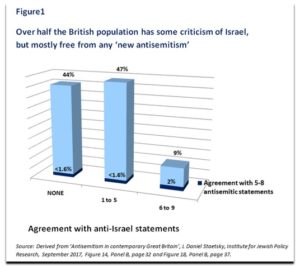Antisemitic criticism of Israel is NOT widespread in the Labour Party
08 Apr 2019
JVL Introduction
There has been a lot said recently about contemporary or ‘new antisemitism’ expressed as criticism of Israel.In order to advance our appreciation of its prevalence, Alan Maddison has explored this topic with a particular focus on the influence of political affiliations, using relevant data drawn from L Daniel Staetsky’s important recent study for the Institute for Jewish Policy Research, Antisemitism in contemporary Great Britain.Among the interesting findings presented here, we discover that the risk for a critic of Israel being antisemitic increases as we move from left to right across the political spectrum.The implications of this analysis for the Labour Party include responding vigorously to any victim complaints, but having appropriate actions based on differentiating between legitimate criticism of Israeli policies, a minority motivated by antisemitism, and those where antisemitic comments may be made out of ignorance rather than any hostility towards Jews.
Antisemitic criticism of Israel is NOT
widespread in the Labour Party
Dr Alan Maddison
Jewish Voice for Labour
7 April 2019
Antisemitism takes different forms in different ages, writes Rabbi Jonathan Sacks… “Today [Jews] are hated because of their nation state, the state of Israel.”[1]This is, supposedly, the ‘new antisemitism’.
There are clearly many valid reasons for criticising Israel – its occupation, its treatment of Palestinians, its violation of international law and more. Such criticism can also sometimes be motivated by antisemitism. To differentiate between the two we have to look at whether such criticism is associated with antisemitism, defined independently of Israel.
We have recently challenged misleading reports that critics of Israeli policies are ‘highly likely” to reflect expressions of this ‘new antisemitism’, when evidence suggests the very opposite. [2]
In this article we explore the patterns of strong anti-Israel attitudes and any associated strong antisemitic attitudes, or ‘new antisemitism’, in British society. In particular we analyse the variations across political groups, and ask if there is any justification for the relentless McCarthy-like focus on the Labour Party?
Exploring the prevalence of ‘new antisemitism’ expressed as criticism of Israel
Our best guide comes from the biggest survey ever undertaken into antisemitism by the Institute of Jewish Policy Research. Its results were published in 2017 under the title Antisemitism in contemporary Great Britain. A study of attitudes towards Jews and Israel.[3]
The author, L Daniel Staetsky, offered a number of ‘anti-Israel’ statements to some 4,005 responders, representative of the British population. These ranged from ‘Israel is committing mass murder in Palestine’ or ‘Israel has too much control over global affairs’ to ‘People should boycott Israeli goods and products’.
He found that 47% of responders had an unfavourable opinion about Israel and/or endorsed 1-5 of the statements presented to them while a further 9% agreed with 6 or more statements. The latter group were defined by Staetsky as having ‘strong anti-Israel attitudes’.
The responses illustrated below, derived from from Staetsky’s data, show that critics of Israeli policies are very prevalent in our society, but only rarely seem associated with antisemitism.
It is disingenuous to frame debates about the Israel-Palestine conflict primarily around ‘new antisemitism’ when most critics of Israel are clearly motivated by other factors, such as advocating social justice and equal rights for Palestinians, or respect for international law.
Recognising that “antisemitism at the individual level is a state of mind and emotions” and that these are complex, the survey “undertook a detailed study of the spread and intensity of various antisemitic ideas and attitudes, and developed what we subsequently called an ‘elastic view’ of antisemitism – i.e. multiple ways of measuring the extent to which antisemitic attitudes permeate society”.(p.12)
So here a range of statements about Jews, positive and negative, were used: A British Jew is just as British as any other British person, British Jews make a positive contribution to British society, Jews think they are better than other people/Jews have too much power in Britain, Jews exploit Holocaust victimhood for their own purposes, down to Holocaust denial
The survey found that 30% of responders endorsed at least one statement considered to be ‘antisemitic’ but most were not considered to be antisemitic as they had also agreed with at least one positive statement about Jews.nHowever, 3.6% of responders agreed with 5 or more ‘antisemitic statements’ and were considered by Staetsky as probably ‘antisemitic’ in terms of having a dislike or hostility towards Jews for being Jews.
If we focus on the 9% of responders in Figure 1 above, those who were considered strongly anti-Israel, we see only 2% had strong antisemitic attitudes (shown in deep blue).
So, of the total 3.6% responders overall with strong antisemitic attitudes, little more than half (2/3.6 or 56%) of them also shared strong anti-Israel attitudes. The remaining 1.6% were distributed among the 91% of the population not having any strong anti-Israel attitudes.
The fact that the remaining 44% (1.6/3.6%) of the ‘antisemites’ were not strong critics of Israel is hardly a surprise. Some on the extreme right are both very pro-Israel and aggressively antisemitic. Others may be ignorant about Israel, or even be motivated not to criticise Israel by a prejudice of Islamophobia against Palestinians outweighing their antisemitism.
If we return to the 9% of the British population with ‘strong anti-Israel attitudes shown above, then antisemites were 22% of them (2/9%). It is this group we might choose to refer to as probably being “new antisemites”
We do not, however, know how many of this group were driven by pre-existing antisemitism to criticise certain acts of the “Jewish” State of Israel, and how many developed a generalised dislike for Jews because they were witness to those acts and reacted against them by blaming “the Jews”.
However, we can investigate how this average 22% antisemitism overlap varies across the political spectrum.
‘New antisemitism’ and political affiliation
To illustrate the relationship between strong anti-Israel attitudes and ‘new antisemites’ by political groups, we have applied the general 56% (2/3.6%) overlap of antisemitism mentioned earlier, and combined and simplified the graphs provided by Staetsky.
In Figure 2 we see strong anti-Israel attitudes occur across the whole political spectrum, but with greater prevalence on the left (13% to 22.5%) than right ( 8.5% to 19%).
‘New antisemitism’ (shown as deep blue from the baseline) is also apparent in all political groups, but this time is more prevalent on the right (2% to 7.3%) than the left (1.4% to 2.3%) of politics
Staetsky himself commented on the fact that the low prevalence of strong antisemitic attitudes for the ‘very left-wing’ were indistinguishable from other groups apart from the ‘very right-wing’. This is important, for it exposes as a myth the idea of a greater prevalence of antisemitism on the far left, or the unfounded claim that the Labour Party has become more antisemitic due to an alleged influx of ‘very left-wing’ members.
It is also clear that if we are looking for ‘new antisemitism’ at the political extremes, attention should focus on the ‘very right-wing’, where 40% (7.6/19) of this group of individuals are ‘new antisemites’ and not the ‘very left-wing’ where we find only 10% (2.3/22.5).
Strong anti-Israel attitudes on the left and far left (illustrated by the pale blue surface area) are more often free from ‘new antisemitism’ than those on the right, and therefore more likely to be motivated by previously mentioned values of social justice and equal rights for Palestinians. From the data in Figure 2, it would be tempting to conclude that although ‘new antisemitism’ is found across the whole political spectrum, in order to tackle it effectively we should focus more on the ‘very right-wing’. But…..
Factoring in the size of each political group
In this survey the ‘very right-wing’ group only represents 1.4% of the population, so even if they are almost four times more likely to be ‘new antisemites’ than the average strong critic of Israel, we can estimate that this group only provides around 5% of the new antisemitism found in society.
The ‘very right wing’ may merit special attention but we obviously need to consider the other 95%. What are their political affiliations?
To answer that question we need to factor in the population sizes for each political group. Figure 3 below shows how participants in Staetsky’s survey responded when asked where they would place themselves on the political spectrum.
The largest group was the ‘centre’ with 36.5% of responders, the smallest groups were at the extremes.
In total there were more people identifying themselves as ‘left-wing’ (27.8%) than ‘right-wing’ (23.5%), and a significant 15.2% did not know how to position themselves.
‘New antisemitism’ by political group
If we combine the prevalence of ‘new antisemitism’ for each group with its population size, we can then estimate the contribution of each to the 2% prevalence of ‘new antisemitism’ we find in society, as shown in Figure 4 below.
Even though the population of the combined right-wing groups (23.5%) was smaller than that for the left-wing groups (27.8%), the right-wingers provided slightly more of the ‘new antisemites’ (25%) than the left-wingers (23%). This was largely, but not solely, down to the ‘very right-wing’ group, which from only 1.4% of the population provided 5% of ‘new antisemites’.
We can see that the 39% share of the ‘centre’ group was slightly higher than their population share of 36.5%, also reflecting a slightly greater than average prevalence of ‘new antisemitism’ among that group.
Participants in the Staetsky survey were then asked for which political party they would vote or would favour (Figure 23 page 44). We find some voters from all political parties in this large ‘centre’ group but in particular 34% voted Labour and 42% Conservative. In fact, based upon the responses given for the voting preferences for all these political groups we can also build a rough estimate of the distribution of all ‘new antisemites‘ by political party.
As expected, this confirms a slightly higher prevalence of ‘new antisemites’ in Conservative than Labour voters.
It has to be said that these are very approximate estimates as they are based on just 80 ‘new antisemites’ (2%) found in the initial group of 4005 respondents.
We can say that the ‘new antisemites’ seem fairly evenly distributed, and of low prevalence, across all political parties, and is probably slightly lower in left-wingers and Labour than right-wingers and Conservative voters.
The implications
In this analysis we see that over half (56%) of the British population, across the whole political spectrum, has some criticism of the way Israel is treating Palestinians. For the vast majority of the population such criticism is free from any antisemitism. The prevalence of those with strong anti-Israel attitudes is also found across the political spectrum, but as shown in Figure 1, it is higher in ‘left-wing’ groups (pooled mean of 15%) than ‘right-wing’ groups (pooled mean of 10%). However, the variation in prevalence of associated ‘new antisemitism’ is far more marked, as shown in Figure 5 below
We see that as we move from left to right on the political spectrum then the trend is for more ‘new antisemitism’ to be associated with strong criticism of Israel, rising from only 10% of the ‘very left-wing’ group to 40% of the ‘very right-wing’ group.
This pattern is determined both by increases in antisemitism and decreases in strong anti-Israel sentiment as we move from the left to right of politics.
Lately, in claimed searches for ‘new antisemitism’, there has been a particular scrutiny of ‘left-wing’ groups and the Labour Party. This campaign has been linked to high levels of media and political focus on the inevitable cases of alleged ‘new antisemitism’ discovered.
Not only is this selective scrutiny and publicity unjustified, but based on the available evidence presented here, it will provide a very distorted view of the relative threats of antisemitism in wider British society, playing down those from the political centre and right but especially the growing far right movements.
So the exceptionally high volume of attacks concentrated on the Labour Party and left-wingers seems, as some suggest, not to be about antisemitism, but about undermining Jeremy Corbyn and stifling necessary debate on Israel.
A similar process is happening in the USA too. Jewish Senator Bernie Sanders recently defended Muslim Representative Ilhan Omar against violent accusations of antisemitism, [4] saying:
Campaigns to stifle such useful debate have also been criticised by Kenneth Stern, one of the original drafters of what became the IHRA definition on antisemitism.[5] He condemned its misuse, and says that “outside groups will try and suppress – rather than answer – political speech they don’t like” with a “chilling McCarthy-like exercise”. This is precisely what has happened in the UK, including use of serious intimidation.[6,7]
So a distinction has to be made between activities that are part of the genuine fight against antisemitism and those dishonestly employed for factional advantage or political gain, including the suppression of legitimate debate on the ongoing Israel-Palestine conflict.
The former needs to be energetically supported, but the latter vigorously challenged for the widespread damage it inflicts.
What should the Labour Party do?
Labour must continue to fight antisemitism and other forms of racial and religious prejudices in society and to deal with them all within its own ranks in the same way. It may be that prevalences are much lower than mainstream media and opponents of Corbyn claim but nonetheless Labour must respond seriously and wholeheartedly to all genuine victim complaints.
It should resist the politically motivated McCarthy-like witch hunt attempts to destroy our movement, even from within.
Grossly exaggerated and misleading claims of antisemitism in the Labour Party have already been exposed.[8,9,10] But Labour also needs to publicly challenge pro-Israel groups and others who selectively scour social media solely to undermine Labour’s electoral prospects and deprive its members of their precious freedom of speech.
Labour must leave no victim group behind, and must ask all members to unite, to continue to stand alongside all our ethnic minority communities including our Jewish neighbours, to challenge the Tory’s “hostile environment” and the growing threat from the growing far right and fascist movements.
While being relentless in our opposition to hard-core antisemitism, we need to remember that many offensive comments and attitudes are born out of ignorance rather than hostility. So an education programme would seem appropriate – and urgent. But as the late A Sivanandan, from the Institute of Race Relations recommended [11], this should not be a community-specific exercise but an inclusive one. Such education should also cover all forms of far more prevalent racial and religious prejudices, including Islamophobia. They all share a similar pathway of stereotypes adoption against “the other”, and subsequent exploitation towards discrimination, blame, scapegoating and abuse.
In this way Labour members can work with all minority groups to share experiences and unite in a sincere attempt to combat all the ignorance or hatred in our society that affects us all.
- Rabbi Jonathan Sacks, The Mutating Virus: Understanding Antisemitism, 27th September 2016 in Brussels.
- The New-Antisemitism: Proof At Last? Jamie Stern-Weiner and Alan Maddison, for JVL, 24th February 2019
- Antisemitism in contemporary Great Britain, L Daniel Staetsky, Institute for Jewish Policy Research, September 2017
- Sanders defends Omar: Can’t equate anti-Semitism with ‘legitimate criticism’ of Israel, Tal Axelrod, The Hill, 6th Mrch 2019
- Extracts of written testimony of Kenneth S Stern, Before the US House of Representatives Committee on the Judiciary, November 7, 2017
- “Jewish event at Labour conference abandoned after bomb scare”. Kevin Rawlinson, The Guardian, 25 September 2018.
- Listen: Horrific antisemitic voice message sent to left-wing Jewish Labour activist, The Skwawkbox, 15th March 2019.
- Antisemitism: no justification for singling out Labour, Dr Alan Maddison, Jewish Voice for Labour, 16 February 2019
- Searching for the truth about on-line abuse allegations, Dr Alan Maddison, Jewish Voice for Labour, 28th February 2018
- Has the Labour left subjected Luciana Berger to hate speak and death threats? Bob Pitt, Medium, 20th March 2019
- Submission from the IRR to the Labour Party Inquiry into anti-Semitism and other forms of racism, A. Sivanandan, Liz Fekete and Jenny Bourne, Institute of race relations, 23rd June 2016.









